Race and Responsibility: When You Hear Evil or See Evil, Speak Out Against It
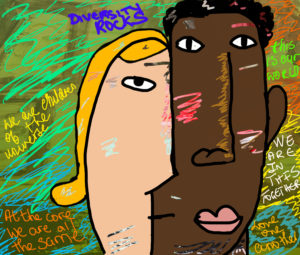 Hate. Anger. Violence. I don’t know about you, but when I hear, see, smell any of these, my fear index flies off the charts. Whether it be physical, verbal, or emotional—hate, anger, and violence trigger me–deeply. That’s when the fight or flight reflex kicks in. I most often choose flight. Or I freeze and shut down.
Hate. Anger. Violence. I don’t know about you, but when I hear, see, smell any of these, my fear index flies off the charts. Whether it be physical, verbal, or emotional—hate, anger, and violence trigger me–deeply. That’s when the fight or flight reflex kicks in. I most often choose flight. Or I freeze and shut down.
Hear no evil, see no evil, speak no evil. That ancient Japanese saying has come to symbolize a dangerous way people shut down by looking the other way when it comes to injustice: “In the West, the proverb see no evil, hear no evil, speak no evil means to turn a blind eye to something that is legally or morally wrong … and therefore abdicate all responsibility in righting a wrong.” (I found that clear explanation at the grammarist.com.)
Only the Privileged Have the Ability to Turn Away
Seeing no evil, hearing no evil, and speaking no evil is itself rooted in injustice. It smacks of privilege, for it is only the privileged who have the ability to turn away. And there’s the issue of complicity too, for when we keep quiet, we must also share in the blame.
But there are subtler insidious forms of injustice, so baked into our society’s culture, so deeply imbedded in American roots that we often aren’t even aware of their existence. We walk around unconscious–or worse–indifferent.
“An honest examination of the moral state of our society will disclose: Some are guilty but all are responsible … In a community not indifferent to suffering, uncompromisingly impatient with cruelty and falsehood, racial discrimination would be infrequent rather than common.” Rabbi Abraham Joshua Heschel said those words in a speech he gave about religion and race in 1963 at a conference where he met Dr. Martin Luther King Jr.
Racism and injustice can only thrive in the soil of indifference and inaction.
Some are guilty, but all are responsible. Words spoken in 1963. Words so true today.
Sometimes, along with the pain we feel in our hearts when we see an injustice, there exists a relief in our belly that it’s not happening to us. It may be the homeless we see in the cold on the street, the children separated from their parents at the border. Or the Black men and women gunned down for walking, driving, being while Black. We may not experience the suffering many families feel; we may not feel the intensity of their fear. But we’re kidding ourselves if we think any one of us has been untouched or unharmed. Injustice may not be happening to us. But injustice involves us all. “Some are guilty, but all are responsible.” No one can be let off the hook.
So what now? What if we’re ready to accept responsibility, to feel fear, to see, to hear, to work for change? When problems feel so big and have been so longstanding, how do we address them? What can we do?
I don’t have the answer. No one can provide the answer for another. We each have to do what feels right. But I’d like to share some of the do’s—and the don’ts—that feel right to me.
Keep Your Eyes and Ears Open
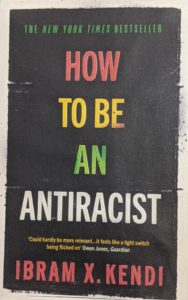 First, I am keeping my eyes open. I’m looking and not looking away. My ears are open too. (I don’t think it’s a coincidence that I just got my first hearing aid last month.) I listen to the voices—sometimes very angry voices—and don’t shut down in the face of deep pain. I’m reading—a lot—about race and trauma. There are so many wonderful resources available along with many helpful lists to guide you as you navigate those resources. I’d like to just share a few of the books, you may already familiar with, that have moved me tremendously and changed my thinking on race and responsibility.
First, I am keeping my eyes open. I’m looking and not looking away. My ears are open too. (I don’t think it’s a coincidence that I just got my first hearing aid last month.) I listen to the voices—sometimes very angry voices—and don’t shut down in the face of deep pain. I’m reading—a lot—about race and trauma. There are so many wonderful resources available along with many helpful lists to guide you as you navigate those resources. I’d like to just share a few of the books, you may already familiar with, that have moved me tremendously and changed my thinking on race and responsibility.
How to Be an Antiracist by Ibram X. Kendi. In his brilliant and very accessible book, Kendi, the founding director of the Antiracism Research and Policy Center, makes this crucial point: “the opposite of ‘racist’ isn’t ‘not-racist.’”
“‘Not-racist,’” according to Kendi, “signifies neutrality…But there is no neutrality in the racism struggle.” One must make a choice—and it truly is a choice—to be either be a racist, “one who is supporting a racist policy through their actions or inaction (my italics) or expressing a racist idea,” or to strive to be what Kendi calls anti-racist, “One who is supporting an antiracist policy through their actions or expressing an antiracist idea.”
Fight Racism as If Fighting a Cancer
There is no middle ground. And there is no rest! “Like fighting an addiction, being an antiracist requires persistent self-awareness, constant self-criticism, and regular self-examination.” Making the choice to be actively anti-racist (by definition, being anti-racist demands action), is as necessary to our country’s health as fighting cancer is to an individual. Kendi, himself a cancer survivor, ends his book with this powerful metaphor: “What if we treated racism in the way we treat cancer? … Saturate the body politic with the chemotherapy or immunotherapy of antiracist polices that shrink the tumors of racial inequality? … Remove any remaining racist policies, the way surgeons remove the tumors. … detect and treat a recurrence early …”
What if, indeed.
Becoming More Aware—and Less Defensive
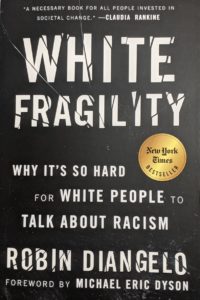 My next book recommendation is Robin DiAngelo’s White Fragility DiAngelo, “a consultant and trainer for over twenty years on issues of racial and social justice,” examines “why it’s so hard for white people to talk about racism,” how this phenomenon plays out in day-to-day experience, and what white people can do to become more aware and less defensive, to stop from turning away. White Fragility is an incredibly powerful read, and, for most white people (I don’t think I’m going out on a limb here) will be brutally—and necessarily—enlightening.
My next book recommendation is Robin DiAngelo’s White Fragility DiAngelo, “a consultant and trainer for over twenty years on issues of racial and social justice,” examines “why it’s so hard for white people to talk about racism,” how this phenomenon plays out in day-to-day experience, and what white people can do to become more aware and less defensive, to stop from turning away. White Fragility is an incredibly powerful read, and, for most white people (I don’t think I’m going out on a limb here) will be brutally—and necessarily—enlightening.
(For an article that looks critically at both How to Be an Antiracist and White Fragility, I highly recommend Kelefa Sanneh’s 2019 piece in The New Yorker “The Fight to Redefine Racism.”
Engage the Body to Heal
My Grandmother’s Hands is a recommendation that adds an element missing from the others I’ve mentioned and from so many readings on 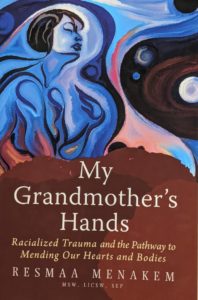 many of the lists available. That element is the body. Resmaa Menakem, a therapist who specializes in trauma, believes that we all—regardless of race—carry racialized trauma in our bodies, passed down to us through the generations. Menakem also asserts that we cannot read, talk, or therapy our way out. The only way true and deep healing can take place around issues of racial trauma is if we address that trauma on the body level. I am a true believer in the healing power of body work and meditation (I have first-hand experience in these healing modalities), and I found what Menakem calls “body practices” for “white readers,” for “non-white readers,” and for “law enforcement professionals” at the end of his chapters extremely powerful. These are not easy, but real growth never is. Menakem also offers a free racialized e-course on his website.
many of the lists available. That element is the body. Resmaa Menakem, a therapist who specializes in trauma, believes that we all—regardless of race—carry racialized trauma in our bodies, passed down to us through the generations. Menakem also asserts that we cannot read, talk, or therapy our way out. The only way true and deep healing can take place around issues of racial trauma is if we address that trauma on the body level. I am a true believer in the healing power of body work and meditation (I have first-hand experience in these healing modalities), and I found what Menakem calls “body practices” for “white readers,” for “non-white readers,” and for “law enforcement professionals” at the end of his chapters extremely powerful. These are not easy, but real growth never is. Menakem also offers a free racialized e-course on his website.
“Discern When to Step Up and When to Step Back”
So … we’ve covered See No Evil and Hear No Evil—what about speech?
Speaking about race is tricky and brings up a whole host of uncomfortable, scary emotions. Perhaps the most impactful piece I’ve read on this topic was written by my friend and speaking coach Alexia Vernon in one of her always impactful newsletter posts.
Vernon works to empower people to use their voices “to become the leaders we are waiting for.” In her post, inspired by this moment, Vernon highlights the lessons she’s learned from a lifetime and “career working at the intersection of social justice and self-improvement.” I’m a great fan of Vernon’s and have learned so much from what she’s shared.
First, according to Vernon, it’s important to “discern when to step up and when to step back … I learned through a mix of making mistakes and developing my self-awareness that when my race, class, sexual orientation, and various other identity markers put me in a place of privilege, it was a good idea to listen a whole lot more than I spoke.”
So Eyes and Ears First, Everybody!
At the same time, though, Vernon states, “I want to make it easy for people to engage in daring conversations, spearhead change, and experience minimal fallout when they inevitably mess up.”
It’s a difficult balance. Everybody makes mistakes. And if speaking about race is new to us—or even if we’ve been having these conversations for many years—we will, as Vernon says, “inevitably mess up.”
Here’s more of Vernon: “I can’t be a stand for people to increase their communication confidence and competence and then freak out on them when they use their voices is a way I perceive to be imperfect … we can ask others to do better AND treat them with dignity in the process …”
I believe her words ring true for ourselves as well. To paraphrase: We can ask ourselves to do better, while treating ourselves with dignity in the process. We need to be kind to others and ourselves.
Nobody grows when they’re shamed.
Look to the Moms
So … we’ve committed to looking and listening, to making space for others’ voices and for speaking up and out. What more can we do?
To answer this, I turn to the ingenuity, creativity, and courage of women—and to the mamma bear that resides in all of us, whether or not we have our own children.
I look to The Wall of Moms.
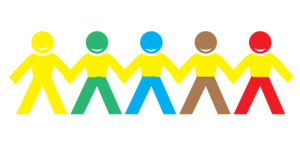
A “network of womxn and non-binary mother-identifying folx” banded together in Portland, Oregon to stand between Black Lives Matter protesters and the heavily armed federal agents in riot gear. (Wall of Moms is also organizing chapters in other Democratic-led cities around the country, including Chicago, New York, Philly, St. Louis, preparing to stand between protesters and the federal law enforcement that President Trump has promised to send to those cities as well.)
Wearing their bright bumble bee yellow shirts, chanting “don’t shoot your mother,” these women did what women have done since the beginning of time—protect the young.
Jennie Vinson, the organizer of the Wall of Moms, was moved to action by the dying words of George Floyd, “To see a grown man reaching out and calling for his mother — I think that was a transformational moment for so many of us. It’s like: What choice do we have but to do this?” she told a Washington Post reporter.
Women. We Will Save the World.
These women embody feeling the fear and doing it anyway theme we’ve talked about so often in the blog: “‘Sometimes we have to be brave and do the right thing even when it feels scary,’” Angie Noriega, another mom in the wall, told her young daughter before she left to stand in protest.
The Wall of Moms is a testament to what people can do when they stand together. They’ve received lots of attention and admiration for the courageous stand that they’re taking. But there’s also been some criticism, if not leveled directly at them, at their quick rise to “fame.” Black women, mothers, have been working tirelessly over decades to deliver their message, but their work and their words have, until recently, largely fallen on deaf ears.
Some believe that the largely white Wall of Moms has coopted the narrative. As Kelly Glass writes in The Washington Post column The Lily, “Wall of Moms is not the story right now. The sacrifices that Black mothers have made out of necessity, love of community and relentless activism — for years and years — is the story. Remembering why we are protesting in the first place and whose lives we are fighting for should be the story.”
There is room for Wall of Moms, and it is certainly time for white women–and men–to stand up and use their privilege for good. But it is also time for those in privilege to support the work, the plans, the messages of those who have been in the trenches all along, to look to those already existing programs that could use additional support and offers of help. White people don’t have to reinvent the wheel–or take over the driver’s seat.
V-O-T-E
In these dark times, I am starting to feel inklings of hope.
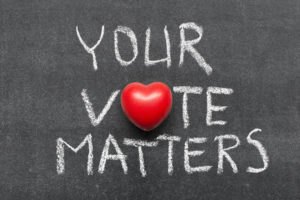
When this piece posts there will be only 91 days until the Election Day. One of the most important and impactful actions any of us can take is exercise our right to vote. Here are the words of the great John Lewis from his last New York Times Opinion piece, published on July 30, the day of his funeral: “The vote is the most powerful nonviolent change agent you have in a democratic society. You must use it because it is not guaranteed.”
Many of us have taken too many of our rights for granted. They are not set in stone. As Lewis wrote earlier in the piece, “Democracy is not a state. It is an act.” Each of us is now being called upon to act, and especially on November 3.
While casting your vote in the presidential race is critical, so is voting in the down-ballot battles. The House, the Senate, governor’s seats. Local leaders have some of the greatest influence on social justice issues and protocols in our country. Educate yourself—I know I am—and then, mail in your ballot EARLY—or step on broken glass if you have to, to get to the voting booth. PLEASE!!!!
Some are guilty, all are responsible. There’s that word again. Responsibility. And choice. We always have a choice.
People are finding many different ways to participate in the movement for greater equality and racial justice in our country. I would love to hear yours.
Please leave a comment or send me an email.
See you August 17th!
XOXO
Diane



New to your blog, I found a kindred spirit in you, Diane! Your words, your book choices, your invitation to hear, see, and speak–yes, yes,…a thousand times yes.
Thank you for offering relevant, sage advice. We know right from wrong; we see the signs of the cancer in our culture and when fear takes over, it paralyzes us. No more. When we see evil, hear evil, we must speak out—each in our own way.
Thank you, Kathie! Love this: “We know right from wrong; we see the signs of the cancer in our culture and when fear takes over, it paralyzes us. No more. When we see evil, hear evil, we must speak out—each in our own way.”
Yay for kindred spirits! We need them now more than ever!!
😬🥺 Once again I am the only person that finds a disengagement from much of the analysis in this post. I strongly believe the BLM movement has been coopted by some that just look to sow disharmony & have a fundamental disliking of America. Flawed as it is, there has been no greater refuge & cause for good in this world. My humble opinion is the protesters have been exposed as more radical opportunists. Sadly what came about that awful Memorial weekend with the death of George Floyd and what seemed to me a National outrage has turned into me against you scenario.
Dorothy, thanks for your comment. Although I disagree (as you can tell from the post) I am grateful that you have shared your thoughts. There is such division in our country right now that many issues on which we would have found common ground in the past seem lost to agreement. I truly believe that coming together to discuss and be heard is a good place to start some of the much needed healing.
Thank you Diane, agreed we all need to be heard & that for me begins with better listening! Taking a breath from hysteria victimhood & respecting the right to free speech or dissenting opinion. Just my two cents 🤷🏻♀️
Yay for free speech–and listening, even when it’s difficult!
Thank you for your two cents–they’re always welcome here!
I have been friends with African Americans for decades–in Portland, my home town–yes, the Portland you speak of being invaded as we speak–and here in Albuquerque. I have volunteered for African American candidates in Portland, as late as 2018 when I made remote calls for JoAnn Hardesty, first African American EVER on all-white Portland City Council! (And JoAnn would be a good person for you to interview, Diane–https://1clickurls.com/xu1OtVm)
I recently joined the local NAACP and belonged to and was an active volunteer through the Rainbow Coalition, which has sadly since dissolved. I also am a participating member of The Poor People’s Campaign, which had a live event yesterday and jammed Mitch McConnell’s phone lines, all of them. http://www.poorpeoplescampaign.org
As far as the presidential election goes, I am making phone calls for Biden 5x a week and they aren’t pretty or easy but it’s what I’ve been doing for the past 21 years and am immensely relieved we are not walking door-to-door!
Back surgery scheduled for September so looking forward to being anesthetized from USA problems for a short while, yay!
Diana! So wonderful to hear from you, and thank you for showing us all so many different ways to get involved–especially in local and national politics! You certainly don’t sit on the sidelines! Thanks for the JoAnn Hardesty suggestion and best of luck on the surgery next month. I have no doubt that no surgery will get in the way of your vote!
Thank you, Diane! This is so clear and so important and so moving. A brilliant call to action! Thank you!
Thank you, my dear friend!
Excellent post, Diane. I am very intrigued by Menakem’s work. I will check it out. I, like you, believe firmly that not true healing is possible without involving body work. Thank you for the depth of information and the passion.
Thank you, Isidra! Menakem is really something. He did an interview for On Being with Krista Tippitt on June 4. I forgot to include in the post, but here’s the link: https://onbeing.org/programs/resmaa-menakem-notice-the-rage-notice-the-silence/. (My body worker Laura Malfa actually introduced me to him.)
Alison McGhee couldn’t have said it better! I second her feedback! Love and Light~
Love and light back to you, Mia! Thanks!!
Diane – this such a great post. Here’s a couple of things that struck me – the first one was when you said we feel “relief in our belly” – my attention went to my body and that felt important. Then when you recommended My Grandmother’s Hands – I really felt my body. When you connected George Floyd’s words and the Wall of Mom’s – it felt as if reading your words was a total body experience.
And Vernon’s words cautioning us that when we ask for someone to do something different and they do it – we need to be satisfied and not critical that they didn’t do it our way – were so true – and difficult to remember.
The phrase some of us are guilty but all of us are responsible reminded me of what I have learned in analysis. I thought I was responsible. I had no doubts that I was. Then I discovered that there were ways I wasn’t responsible – that I didn’t internally know what real responsibility was. That being responsible is knowing what you believe in and acting on it – even when you are afraid. Very complicated to explain the layers I had to go through to get to my new awareness.
Thank you for all of this!
Thanks, Nicky! So much involves the body, and it is all so complicated! Responsibility is definitely, as you say, “knowing what you believe in and action on it–even when you are afraid.” But not knowing does not release one from responsibility–it is our responsibility to work for greater awareness, to actively look for places where we may be complicit, without “knowing” it. Lots to think about!
Brilliant.
Consider this shared.
Thank you, Greta! XO
Today’s newsletter is wonderful, necessary, kind and fierce. Thank you, Diane. I applaud you for writing it, gathering these resources, and taking action. XO
Alison! Thank you! Coming from such a wonderful, kind, and fierce woman writer, those words mean so much! XO